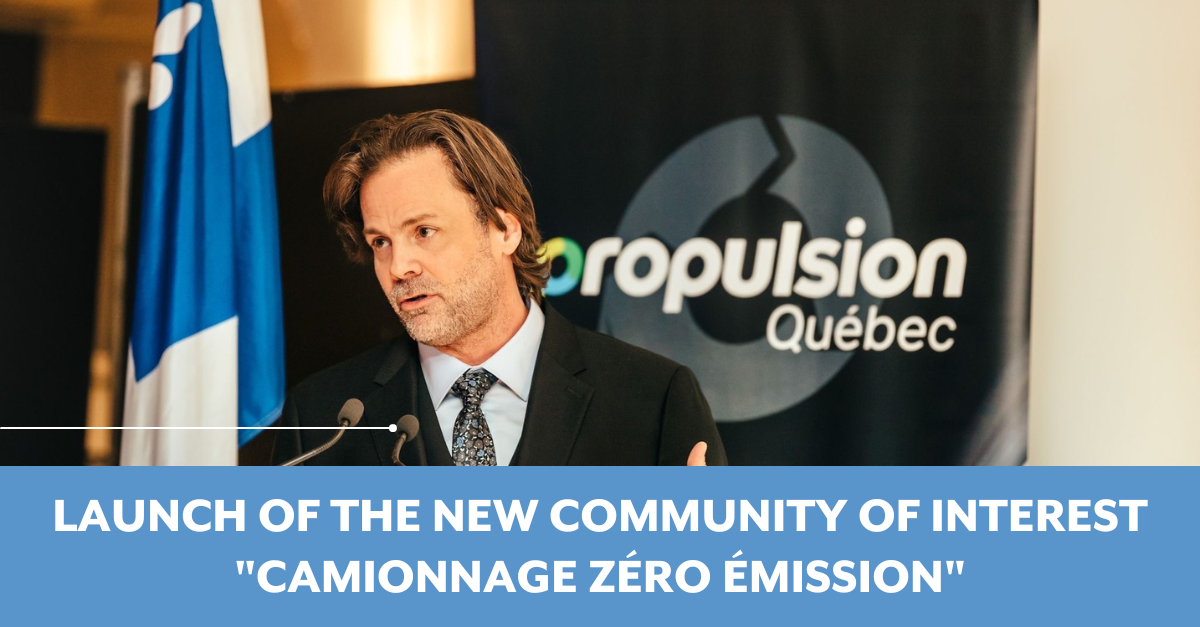Commercial Fleet Management: Strategies, Tools & Tips
Commercial fleet management plays a vital role in keeping businesses running smoothly, especially in industries like transportation, logistics, and...
Keep an eye on the road
Simplify your driver's routine
For efficient decision making
Ensure the compliance of your fleet
Simplify the daily life of your drivers
Maximize the value of your data
Unparalleled monitoring of your assets
The friendly competition that pays off
Planning powered by data
Exceed your customers' expectations
Provide better service to your users
Maximize the satisfaction of your citizens
Simplify your daily life on the construction site
Facilitate the electrification of your fleet
Our experts meet your needs
Easily meet the standards
Improve the safety of your drivers
Protect your data and your fleet
2 min read
Roxane Loiseau
Feb 3, 2023 1:45:20 PM

Mont-Saint-Hilaire, Qc, February 3rd 2023 -
Last month, Propulsion Québec's Tournée régionale des chantiers took place in Quebec City and Montreal. This event, sponsored by Quebec-based AttriX Technologies, was an opportunity to provide an update and discuss the program's current and future projects. It was during this tour that the main actors of the IET industry and the many Quebec visionaries present were able to see the commitment of Anthony Mainville. Indeed, it was on these occasions that the President of AttriX announced his involvement as President of the Zero Emission Trucking Community of Interest, recently established by Propulsion Québec and the TEI ecosystem.
"The objective of the community of interest is clear. We want to guid and support members of the Quebec transportation industry as effectively as possible in their adoption of electric vehicles. I am honored to chair this important roundtable. My mission is to bring together the best experts in the fields of transportation, electrification and technology to initiate a valuable collaboration that I believe will significantly advance our path towards greener and more sustainable commercial transportation," said Anthony Mainville, at the event hosted by Sarah Houde's team.
This comes as no surprise to members of the trucking industry, as Mr. Mainville has always shown a keen interest in new technologies that will help decarbonize transportation and a sincere desire to get involved in achieving the goals set by the Quebec government. Since the transportation sector represents approximately 42% of the potential for GHG reduction in Quebec by 2030, Propulsion Québec has decided to take the bull by the horns and tackle what is shaping up to be the biggest revolution in the transportation sector since the arrival of the combustion engine in the late 19th century.
Obviously, the members sitting at the table of this new community of interest are well aware of the issues involved in the electrification of transportation and the challenges facing the industry, particularly with regard to heavy trucks and long-distance travel. Mr. Mainville mentioned that the panel of experts, gathered at the first meeting of the IC, had identified the major obstacles to the adoption of commercial electric vehicles. Of course, the economic aspect was quickly mentioned, including planning and expenses related to charging infrastructure, initial acquisition costs, considering the recent increase in prices caused by inflation, the essential education to be conducted with an already highly solicited industry, as well as the impact of the weight restrictions in force. Regulatory gaps were also raised, as well as the lack of specialized resources for both electric vehicle maintenance and charging systems. Other obstacles were identified, such as the lack of energy efficiency for long distances or in cold weather.
Although there are several major challenges on the road to decarbonizing the transportation industry, Ms. Houde and Mr. Mainville answered questions from the audience during the Tournée régionale des chantiers with determination and optimism. From their first meeting, the community identified a number of solutions to be explored in order to facilitate the energy transition of Quebec's transporters. Given the complexity and specific needs of the industry, the IC is considering the creation of a sub-committee dedicated to alternative energies such as green hydrogen, in order to overcome certain current limitations of electromobility. In the end, it is reassuring to know that experts in the transportation, electrical vehicles and electrical infrastructure industries are working together to make Quebec a world leader in energy transition and greenhouse gas emission reduction.

Commercial fleet management plays a vital role in keeping businesses running smoothly, especially in industries like transportation, logistics, and...

In fleet management, fleet compliance services play a much bigger role than just checking a box. They’re about keeping your drivers safe, your...

Trucking has always come with its fair share of challenges, from road safety and liability issues to managing fleet efficiency. As the industry...